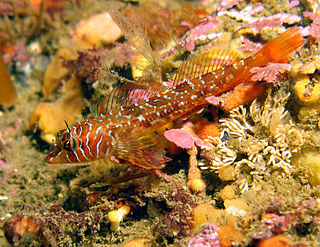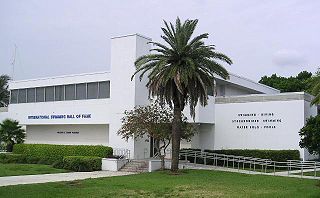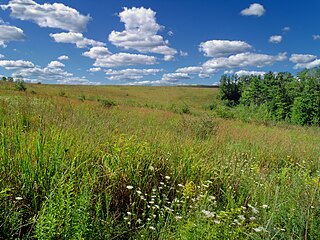
A gill is a respiratory organ that many aquatic organisms use to extract dissolved oxygen from water and to excrete carbon dioxide. The gills of some species, such as hermit crabs, have adapted to allow respiration on land provided they are kept moist. The microscopic structure of a gill presents a large surface area to the external environment. Branchia is the zoologists' name for gills.
The aquatic ape hypothesis (AAH), also referred to as aquatic ape theory (AAT) or the waterside hypothesis of human evolution, postulates that the ancestors of modern humans took a divergent evolutionary pathway from the other great apes by becoming adapted to a more aquatic habitat. While the hypothesis has some popularity with the lay public, it is generally ignored or classified as pseudoscience by anthropologists.

Limnology is the study of inland aquatic ecosystems. The study of limnology includes aspects of the biological, chemical, physical, and geological characteristics of fresh and saline, natural and man-made bodies of water. This includes the study of lakes, reservoirs, ponds, rivers, springs, streams, wetlands, and groundwater. Water systems are often categorized as either running (lotic) or standing (lentic).

Aquatic plants are plants that have adapted to living in aquatic environments. They are also referred to as hydrophytes or macrophytes to distinguish them from algae and other microphytes. A macrophyte is a plant that grows in or near water and is either emergent, submergent, or floating. In lakes and rivers, macrophytes provide cover for fish, substrate for aquatic invertebrates, produce oxygen, and act as food for some fish and wildlife.

An aquatic animal is any animal, whether vertebrate or invertebrate, that lives in water for all or most of its lifetime. Many insects such as mosquitoes, mayflies, dragonflies and caddisflies have aquatic larvae, with winged adults. Aquatic animals may breathe air or extract oxygen from water through specialised organs called gills, or directly through the skin. Natural environments and the animals that live in them can be categorized as aquatic (water) or terrestrial (land). This designation is polyphyletic.
World Aquatics, formerly known as FINA, is the international federation recognised by the International Olympic Committee (IOC) for administering international competitions in water sports. It is one of several international federations which administer a given sport or discipline for both the IOC and the international community. It is based in Lausanne, Switzerland.

The European Aquatics Championships is the continental Aquatics championship for Europe, which is organised by LEN—the governing body for aquatics in Europe. The Championships are currently held every two years ; and since 2022, they have included 5 aquatics disciplines: Swimming, Diving, Synchronised swimming, Open water swimming and High diving. Prior to 1999, the championships also included Water polo, which beginning in 1999 LEN split-off into a separate championships. The open water events are not held during the Olympic year.

The International Swimming Hall of Fame and Museum (ISHOF) is a history museum and hall of fame, located at One Hall of Fame Drive, Fort Lauderdale, Florida, United States, operated by private interests and serving as the central point for the study of the history of swimming in the United States and around the world. Exhibits include ancient art and both reproductions and original art depicting famous moments in swimming history, swimwear, and civil rights, as well as memorabilia and artifacts belonging to persons who have promoted or excelled in aquatics. It is recognized by FINA as the official hall for the aquatics sports.

The Life Aquatic with Steve Zissou is a 2004 American adventure comedy-drama film written by Wes Anderson and Noah Baumbach and directed by Anderson. It is Anderson's fourth feature-length film and was released in the United States on December 25, 2004.

An aquatic ecosystem is an ecosystem found in and around a body of water, in contrast to land-based terrestrial ecosystems. Aquatic ecosystems contain communities of organisms—aquatic life—that are dependent on each other and on their environment. The two main types of aquatic ecosystems are marine ecosystems and freshwater ecosystems. Freshwater ecosystems may be lentic ; lotic ; and wetlands.

The London Aquatics Centre is an indoor facility with two 50-metre (164-foot) swimming pools and a 25-metre (82-foot) diving pool in Queen Elizabeth Olympic Park in Stratford, London. The centre, designed by architect Zaha Hadid as one of the main venues of the 2012 Summer Olympics and the 2012 Summer Paralympics, was used for the swimming, diving and synchronised swimming events. After significant modification, the centre opened to the public in March 2014.
The World Aquatics Swimming Championships (25m), formerly known as the FINA World Swimming Championships (25m), also referred to as 'short course worlds', are an international swimming competition staged by the internationally recognized governing body of the sport, World Aquatics. The championships are staged in a 25m pool, referred to as short course format, and traditionally have been held biennially in alternate years to the World Aquatics Championships. Unlike the World Aquatics Championships, only swimming events are staged at these championships.

Terrestrial animals are animals that live predominantly or entirely on land, as compared with aquatic animals, which live predominantly or entirely in the water, and semiaquatic animals, which rely on both aquatic and terrestrial habitats. Some groups of insects are terrestrial, such as ants, butterflies, earwigs, cockroaches, grasshoppers and many others, while other groups are partially aquatic, such as mosquitoes and dragonflies, which pass their larval stages in water.

A terrestrial plant is a plant that grows on, in, or from land. Other types of plants are aquatic, epiphytic, and lithophytic.

The World Aquatics Swimming World Cup is an international series of swimming meets organized by World Aquatics. Launched in 1988, the World Aquatics Swimming World Cup is staged between August and November every year and attracts a high level of athletes due to the considerable prize money on offer. The event is traditionally held in short course format, with a switch to long course format in pre-Olympics years.
The swimming portion of the 2011 FINA World Championships was held July 24–31 at the Shanghai Oriental Sports Center in Shanghai, China. Swimming is one of five aquatic disciplines at the championships.
From 2015 to 2022 when the World Aquatics was still known as FINA, neutral athletes have competed under the designation Independent FINA Athlete (IFA) either due to their national federation's suspension of their governing body or as refugees.











